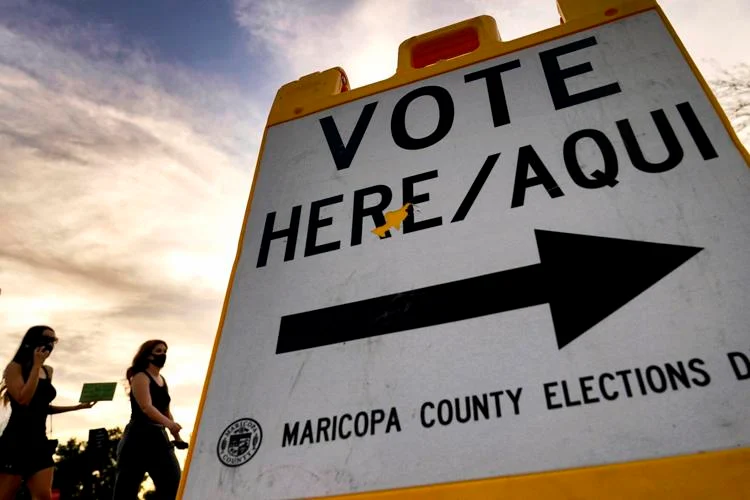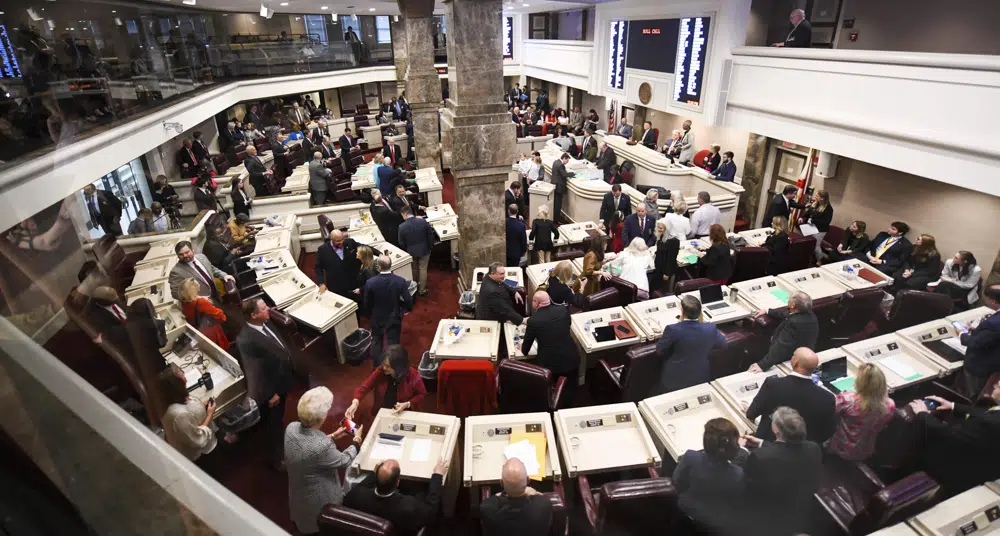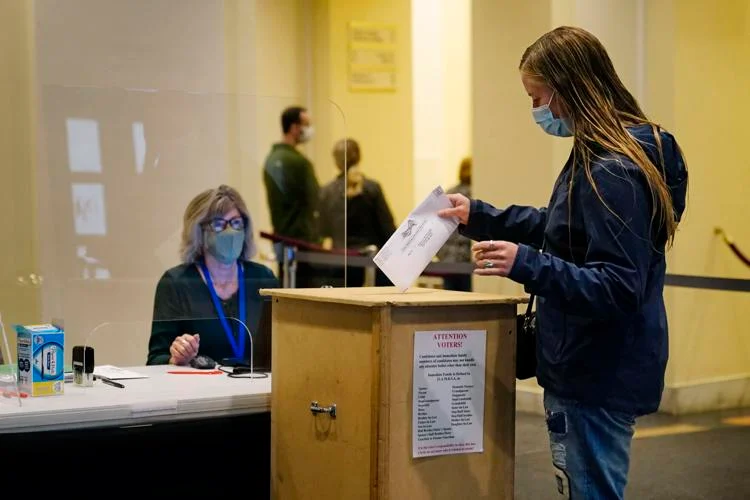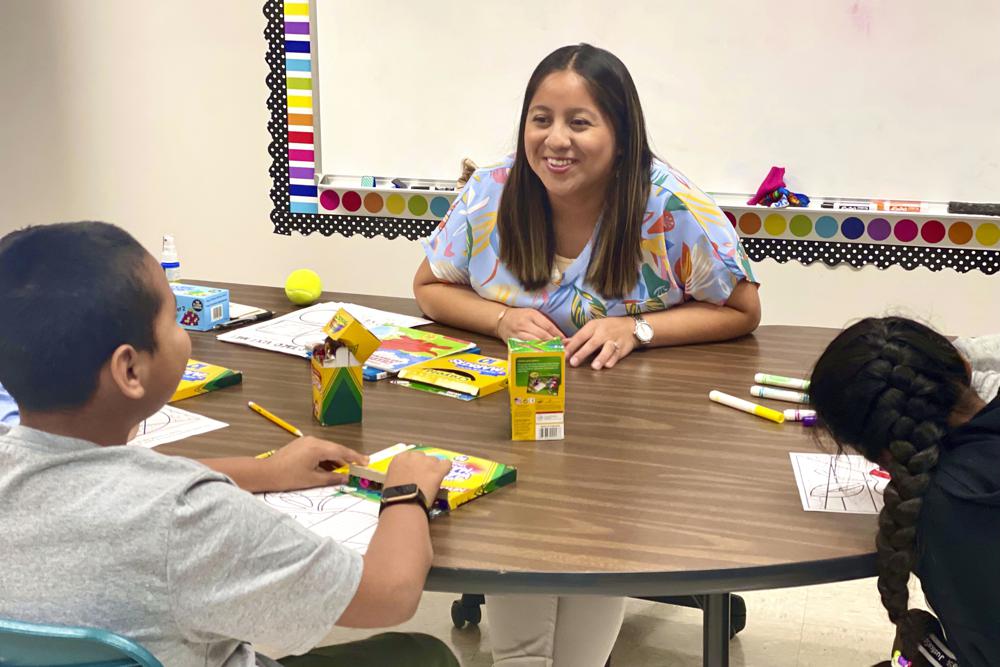Alabama voter registration climbs, but turnout lags rest of nation

by Ralph Chapoco, Alabama Reflector September 15, 2023 This article is part of U.S. Democracy Day, a nationwide collaborative on Sept. 15, the International Day of Democracy, in which news organizations cover how democracy works and the threats it faces. To learn more, visit usdemocracyday.org. While Alabama has enjoyed record numbers in terms of people registering to vote, voter rights groups point to troubling signs despite those figures for voters gaining access to the ballot box to exercise their constitutional right as citizens. Alabama Secretary of State Wes Allen and his predecessor, John Merrill, have pointed to a 32% increase in voter registration in the last decade as a sign of greater interest in the process. But election turnout has lagged other states, even in presidential election years. More than 2.3 million Alabamians cast ballots in the 2020 presidential election. In terms of volume, that was a record, but it only represented 62% of Alabama voters casting votes, one of the lowest presidential turnouts in 30 years. “One of the things that we have seen, we are still seeing, is low turnout,” said Kathy Jones, president of the League of Women Voters of Alabama. “Presidential elections get high turnout, but in the elections at the local level, and during the midterms, you see pretty sad turnout. That is not good for democracy.” The reasons for the disparities have to do with culture, state laws that impede access to the ballot, and a lack of competitive elections. Allen and Merrill have turned to the public airwaves to claim credit for the number of active, and registered voters in Alabama. The state has steadily increased that number, going from about 2.8 million about a decade ago to roughly 3.3 million at the end of 2022. Through the end of August, the state’s voter rolls increased by an additional 30,000 people. Richard Fording, a professor of political science at the University of Alabama, said “the numbers aren’t bad.” But relatively few Alabamians exercise their right to vote, a continuation of a longstanding problem that has plagued the state for decades. According to data compiled by Michael McDonald, a political science professor at the University of Florida, only 37.3% of eligible voters turned out for the November 2022 elections, the fifth-worst in the United States. Mississippi, another southern state, fared the worst at 32.5%. Tennessee, West Virginia, and Indiana were the only other states with lower turnout than Alabama. The issue starts with the state’s history. “Alabama was classified as a state with a traditionalistic political culture,” Fording said. “That means a few different things, but with respect to the orientation of government participation, it is an elitist orientation.” That culture emerged from a backdrop of slavery, segregation, and disenfranchisement of large swathes of voters, mostly Blacks but also poor whites. Elites in the state maintained the status quo through literacy tests, poll taxes, and other discriminatory voting practices. Though those have been outlawed, their impact on the state’s political culture remains. “When there is a system that is the status quo, those who benefit from it want to rationalize that system, as being just,” Fording said. “And if they have the power to do that through various channels of socialization like the education system, then that is likely to become embedded somewhat permanently in the culture.” Several crosscurrents have taken shape that stem from that history that have served to depress voter turnout. “We have started out way behind,” Fording said. “And so, it is just harder to finish first when starting last.” Foregone conclusions The low turnout is not tied to a party. In the 2006 elections, when Democrats controlled the state Legislature, voter participation was 36%. Some demographic trends may play a role. Education tends to correlate with voter participation, and Alabama has a smaller percentage of college graduates than the nation as a whole. Party strength can also influence turnout. “In a large sense, there is not a lot of democracy because it is a foregone conclusion that most of the outcomes are going to be Republican,” said Thomas Shaw, an associate professor in the Department of Political Science and Criminal Justice at the University of South Alabama. The state is solid red, with the Republicans holding the governor’s office, all statewide elected positions, and the state Legislature. Democrats, once the dominant party in the state, have held onto power in the Black Belt and the state’s cities. But the state has not voted for a Democratic presidential nominee since 1976, and Democrats have won only one statewide election (the 2017 special election for U.S. Senate) since 2010. That can depress turnout. It also makes candidate recruitment difficult. The Democrats’ statewide candidates in 2022 were mostly inexperienced and underfunded. That depressed turnout to the point that normally safe Democratic legislative districts saw closer-than-expected races. “The people they put on the ballot in 2022 were no-name nobodies who got some of the least amount of support in the entire history of Democratic politics in Alabama,” said David Hughes, an associate professor of political science at Auburn University Montgomery. The state party is embroiled in a fight over its bylaws and leadership. Leaders of the party voted in May to disband three diversity caucuses and adopt new bylaws, replacing a set adopted in 2019 amid a Democratic National Committee (DNC) investigation. The DNC is investigating the May meeting. “I don’t think anybody would look at the state Democratic Party and say that it is functional,” Hughes said. All of that weighs on turnout, said Shaw. “If it is a presidential election, and you are a Democrat in Alabama, you know there is no chance that your candidate is going to get elected in Alabama; how does that make you feel about going to the polls,” he said. “It makes you feel like, ‘Why should I bother?’” Ballot access Legislators in recent years have also taken to making voting more difficult. Alabama does not have early voting or no-excuse absentee voting. The
Paul DeMarco: Alabama Legislature should tackle election reform in upcoming reapportionment special session

So it appears that lawmakers will be called back to the Alabama statehouse on July 17th to draw new U.S. Congressional districts as required by a recent ruling of the United States Supreme Court. The court ruled that Alabama should establish two districts where a minority could be elected to represent the state in Congress; as of now, there is one. The first priority for Alabama State Representatives and Senators in July will be to pass a new map. However, when legislators are back in Montgomery to debate and approve the new districts, there will also be time to take up another important election issue as well. This past session, a bill sponsored by Representative Jamie Kiel that would have banned ballot harvesting died on the last day legislators met this past Spring. The new law would have made it illegal to pay or be paid for the collection of absentee ballots delivered to polling places. The legislation had passed the Alabama House of Representatives overwhelmingly and a Senate Committee; thus, it was in a position to win approval from the full Senate but never made it to the calendar. There is no question that if it were up for a vote, the supermajority of Republican Senators would have sent the bill to the Governor to sign. Alabama Secretary of State Wes Allen supported the legislation and cited the multiple convictions for fraud related to absentee ballots over the past decade as one of the impetus for the need of this new law. With Democrats in a position to possibly pick up a second Congressional seat in Alabama in 2024, there will be hundreds of thousands of dollars spent in the state’s general election. Republicans hold a slim majority in the United States House of Representatives. Thus the eyes of the Nation will be watching this general election in Alabama. Thus, you can count on major money being sent by national political action committees to the state for get-out-the-vote efforts, as we saw in the 2020 elections. Governor Kay Ivey and lawmakers should agree that the integrity of Alabama elections is essential and cleaning up the absentee ballot process must be a priority. Hopefully, we will see this legislation considered along with the new Congressional maps to be drawn in the upcoming special session. Paul DeMarco is a former member of the Alabama House of Representatives and can be found on Twitter @Paul_DeMarco.
Special session to be held next month

The U.S. Supreme Court surprised many court observers earlier this month when it ruled that Alabama’s congressional redistricting passed in 2021 violated the Voting Rights Act of 1965. The special session to address the redistricting will be next month. 2024 is a presidential election, and the Alabama major party primaries will be early in that cycle on March 5. This means that campaign qualifying with the major parties will begin in November. The three-judge panel of the Eleventh Circuit Court of Appeals in Atlanta has ordered the state to present a redistricting plan acceptable to the court, or the court will appoint a special master to do it. State Representative Mack Butler (R-Rainbow City) told Alabama Today that he heard the special session would be on July 17. Butler said the special session would narrowly focus on passing a new congressional redistricting plan. Rep. Ron Bolton (R-Northport) addressed BamaCarry of Tuscaloosa County on Monday night. “The special session will be on July 17,” Bolton said. “It will be an agreed-upon bill.” Bolton said that the three-judge panel in Atlanta had set the deadline for the state to submit a compliant redistricting plan as July 21. Rep. Ed Oliver (R-Dadeville) told Alabama Today that the special session should include legislation on the ballot harvesting ban bill that failed in the last session. “That’s the Secretary of State’s bill,” Oliver said. “With two contested congressional races, we need that to ensure that the election is secure.” The federal court ruled that since Alabama is nearly 28% Black, the state should have two congressional districts that are either majority Black or are close to it. Currently, the Seventh Congressional District, comprised of a 55% Black voting population, is Alabama’s only majority-minority district. The other six congressional districts are all less than 30% Black and are all represented by White Republican men. The Seventh Congressional District is represented by Rep. Terri Sewell – the only Black person in the congressional delegation and the only Democrat. Since all seven congressional districts have to be roughly equivalent in size, changing the districts so that two have roughly 48% or more minority voters will mean that all seven districts will change in redistricting. Whereas the Legislature before sought to keep all seven of the incumbents in their districts, that won’t be a consideration in the next redistricting plan, so it is likely that some incumbents could be redistricted into the same districts. Alabama Republican Party Chairman John Wahl has said the Alabama GOP will contest all seven congressional districts in 2024 – including Rep. Sewell’s. Rep. Oliver said that in that hyper-competitive environment, it is important to have as secure an election as possible, and that is why the call should include the ban on ballot harvesting. House Bill 209 (HB209) passed the House of Representatives in the recent regular session, but the Alabama Senate failed to address it. Ballot harvesting involves paying political operatives to collect absentee ballots. “Over the last decade, there have been multiple convictions for absentee ballot fraud across the state of Alabama,” wrote Secretary of State Wes Allen. “As a Probate Judge, a legislator, and now as Secretary of State, I am committed to eliminating election fraud in our state. HB209, sponsored by Rep. Jamie Kiel, makes incredible strides in protecting the rights of Alabama voters to cast their own votes without undue influence. Currently, it is legal for groups operating as non-profits to offer payments in exchange for absentee ballot applications to Alabama registered voters. HB209 would end that. Today, it is legal for out-of-state organizations to mail pre-filled absentee ballot applications to unsuspecting voters across the state, some of whom have moved or have no intention of voting absentee. HB209 would prohibit this practice.” “HB209 would make it illegal to pay or to be paid by a third party to collect absentee ballot applications or absentee ballots from Alabama voters,” Allen continued. “Furthermore, it would eliminate the ability of organizations to sow the seeds of chaos and confusion by sending pre-filled absentee applications into our state. Our elections are the foundation of our constitutional republic, and nobody should be paid for their absentee application or their ballot. Ballot harvesting should not be a job description.” Democrats, who opposed the bill, called it “voter suppression” and said that it would make it illegal for neighbors to help neighbors fill out their absentee ballot. HB209, as amended in the House, would allow family members to help family members prepare their absentee ballot. “House Bill 209 states that the Secretary of State, probate judges, absentee ballot election managers or their designee,” Rep. Adline Clarke (D-Mobile) said. “Now, it is absolutely unrealistic to believe that these individuals can take up the slack for the hundreds of volunteers that assist voters in every election. It is not humanly possible and will cause a huge decrease in the number of voters who vote absentee. That is a sad thought.” Whether or not the ballot harvesting bill is included in the call for the special session is solely the purview of Gov. Kay Ivey. “I have a wish list, I am sure you have a wish list, but that is up to the Governor,” Sen. Dan Roberts (R-Mountain Brook) told Alabama Today. Roberts warned that including Allen’s legislation in the special session would be “divisive.” Roberts was also skeptical of rumors that a proposed constitutional amendment addressing gambling could be in the call. “I had not heard that,” Rep. Butler said when asked about the gambling bill rumor. “I think it is going to be a simple one-issue special session.” “In all of the communications that I have had with Speaker (Nathaniel) Ledbetter, he has not given me any indication to think that is being considered,” Oliver said of the gambling rumor. Butler said that with two highly contested congressional races on the ballot in 2024, “We are going to need every Republican to turn out.” To connect with the author of this story or to comment, email brandonmreporter@gmail.com.
Wes Allen: HB209 prevents absentee ballot harvesting and protects each individual’s right to cast their own ballot

Over the last decade, there have been multiple convictions for absentee ballot fraud across the state of Alabama. As a Probate Judge, a legislator, and now as Secretary of State, I am committed to eliminating election fraud in our state. HB209, sponsored by Rep. Jamie Kiel, makes incredible strides in protecting the rights of Alabama voters to cast their own votes without undue influence. Currently, it is legal for groups operating as non-profits to offer payments in exchange for absentee ballot applications to Alabama registered voters. HB209 would end that. Today, it is legal for out-of-state organizations to mail pre-filled absentee ballot applications to unsuspecting voters across the state, some of whom have moved or who have no intention of voting absentee. HB209 would prohibit this practice. HB209 would make it illegal to pay or to be paid by a third party to collect absentee ballot applications or absentee ballots from Alabama voters. Furthermore, it would eliminate the ability of organizations to sow the seeds of chaos and confusion by sending pre-filled absentee applications into our state. Our elections are the foundation of our constitutional republic, and nobody should be paid for their absentee application or their ballot. Ballot harvesting should not be a job description. Rep. Kiel shepherded HB209 through the Alabama House of Representatives and through the Senate committee. Senator Garlan Gudger will present HB209 for a vote to the entire State Senate and on to Governor Kay Ivey’s desk for her signature. I applaud these two legislators for their efforts to further secure Alabama’s elections and to help protect each individual Alabama voter’s right to cast their own ballot without interference. That is, after all, the foundation of this great nation. Wes Allen is Alabama’s 54th Secretary of State. Allen is a former Pike County judge and served one term in the Alabama House of Representatives representing Pike and Dale Counties.
House considers legislation to create an internet porn registry and require porn sites to have age verification

On Wednesday, the Alabama House Judiciary Committee considered legislation that would require any company that would distribute pornography over the internet to consumers in the state of Alabama to register with the state of Alabama, and that site must have some form of age verification to make sure children cannot access pornography. House Bill 441 (HB441) is sponsored by State Representative Ben Robbins. HB441 is cosponsored by House Majority Leader Scott Stadthagen and Rep. Jamie Kiel. “This bill is trying to prevent children from having access to pornography,” Robbins said. “A company that wanted to distribute pornography would be required to register with the state of Alabama.” Robbins said that this bill is necessary to protect children from the harmful effects of pornography, “The more hyper-sexualized you are, the more violent you become to your partner of the opposite gender,” Robbins explained. “After the registration, a commercial entity is required to have an age verification process to verify that you are at least 18 years old. In some states, they use biometrics. That could be off a credit report. Robbins offered a substitute to the version of the bill that he had originally introduced. “The sub changes some of the language that Rep. (Matt) Simpson had about privacy rights,” Robbins said. “It also addresses the cause of action questions that Rep (David) Faulkner had.” Robbins explained that the substitute makes it severable if one portion of the act is declared unconstitutional, then the rest of the act can remain in place. Robbins added that the bill includes language so that “if they (the porn company) save any data from you, then you would have a cause of action.” Rep. Ontario Tillman asked, “Is this patterned after a similar statute?” Robbins said that initially, his bill was all original but has borrowed some language from bills in other places. “No state or country, as far as I know, have a registration component.” The synopsis states, “This bill would provide legislative findings regarding the public health crisis caused by pornography. This bill would prohibit the distribution of material harmful to minors under 18 years of age. This bill would require distributors of material harmful to minors to take certain reasonable measures to ensure their published material is not distributed to minor children by use of age verification procedures. This bill would require distributors of material harmful to minors to pay a licensing fee to distribute pornography in this state and would provide for the distribution of the fee. This bill would also provide penalties for violations.” A study by the Children’s Commissioner for England found that one out of ten children have watched pornography by the time they are nine years old. Four out of five (79%) surveyed have seen pornography involving violence by the age of 18. One in three young people have actively sought out depictions of sexual violence such as physical aggression, coercion, and degradation. The report, by Dame Rachel de Souza, also points to the harmful effects of exposure to violent pornography. Nearly half of the 16- to 21-year-olds who took part in the survey assumed girls either “expect” or “enjoy” sex that involves physical aggression, such as airway restriction. “Throughout my career as school leader, I have witnessed the harmful impact of pornography on young people. I will never forget the girl who told me about her first kiss with her boyfriend, aged 12, who strangled her. He had seen it in pornography and thought it normal,” she wrote in the foreword to her report. On Tuesday, the Alabama House of Representatives passed legislation to further protect children from pornography by requiring that all new cell phones sold in the state have their installed porn filters turned on. To connect with the author of this story or to comment, email brandonmreporter@gmail.com.
House passes legislation making changes to the public charter schools statute

On Thursday, the Alabama House of Representatives passed legislation making several changes to the Alabama Public School Charter Commission. House Bill 363 (HB363) is sponsored by State Representative Terri Collins. The Alabama School Choice and Student Opportunity Act changes the appointment process for the Alabama Public Charter School Commission; authorizes the Commission to hire staff; requires commissioners to receive annual training; provides additional guidelines for the authorizing and application review process; provides further for the operational and categorical funding of public charter schools in their first year of operation; and clarifies the per pupil federal, state, and local funding of conversion public charter schools during their first year of operation. “All charter schools are public schools,” explained Rep. Collins. “We have three conversion schools in Montgomery, Mobile, west Alabama, Birmingham has a few, Fairfield, and there are a couple more in Montgomery.” “A public system could choose to make a starter school,” Collins stated. “If they have a specific need, they can do it through the charter process.” Collins explained how a public system can convert a failing public school to a charter public school through the formal conversion process. Rep. Tracy Estes thanked Collins for bringing the bill and the hard work in crafting the substitute. The House voted to adopt the negotiated substitute version of the bill to address issues that some members had with the original legislation in a 88 to 13 vote. Rep. Mark Gidley said, “I want to express my appreciation for how you have worked hard on this.” Rep. Jamie Kiel brought an amendment that would restore the local school board as an authorizer. An earlier version of the bill removed that. This amendment was ratified. “I appreciate you working with all of the parties on this,” Kiel said to Collins. Rep. Barbara Boyd said, “I want to thank you for where you have gone and for working with all of the parties, but I would still have preferred magnet schools because those are set aside for specific purposes. I am going to have to vote no today.” “They have to be nonprofit,” Collins said of charter schools. “They can’t be a for-profit. They have to have local support.” Rep. Laura Hall said, “African American boys have a great need, particularly between K and 3irth grade.” Hall said that she had visited the new aviation-focused charter school in Fairfield. “I have been there,” Collins said. “What they are doing is very exciting.” Collins said that students there can work on actual planes and “learn takeoff and landing through a simulator.” Hall said, “The dollars that the system has used sound like they are very well used.” Collins said, “They do everything that a public school does. They do ACAP. They give grades.” Collins said that members of the Commission would be appointed by the governor, the lieutenant governor, the Speaker of the House, the Senate Pro Tem, the House Minority Leader, and the Senate Minority Leader. “They look at applications, and they approve or disapprove,” Collin said of the Commission. “This extends their term from two years to four years.” Rep. TaShina Morris suggested changing the bill so that the state superintendent of education hires the Commission staff. Collins said, “No, we want the commission to choose their own employees.” Rep. Mary Moore said, “I don’t think the state of Alabama can support multiple forms of public schools with one pot of money for education.” Moore complained that the local school board can deny a charter application and “the state of Alabama will go ahead and authorize them to be a charter school when they know they are deficient.” Moore attacked the performance of charter schools. “They (students) are coming back to public schools, and they are not able to do the work,” Moore said. “They are not doing their due diligence. They are not hiring proper teachers. They have teachers that don’t even know how to set up a proper classroom.” Collins replied, “They all have a long waiting list to get in. I don’t know of any who are coming back.” Moore said, “They are taking dollars from the public schools, and they are hurting public schools because they are taking resources.” Collins said, “Charter schools are public schools.” The Alabama House passed HB363 in a 76 to 25 vote. The legislation now goes to the Senate for their consideration. Thursday was day 20 of the 2023 Alabama Regular Legislative Session. The House convenes at 1:00 p.m. on Tuesday. To connect with the author of this story or to comment, email brandonmreporter@gmail.com.
Democrats oppose GOP absentee ballot bill

On May 4, the Alabama House Republicans passed legislation that would severely limit outside groups’ abilities to influence elections. The legislation makes it a felony to pass out absentee ballot applications or assist someone with filling out an absentee ballot application unless they are a family member. On Wednesday, House Democrats held a press conference to express their concerns about that legislation and promote their bills that would make it easier to participate in Alabama elections. House Bill 209 is sponsored by State Representative Jamie Kiel. The House Republicans passed HB209 Thursday on a party-line vote after voting to cloture debate. Rep. Patrick Sellers said, “Sadly, last week, the Alabama House was on the wrong side of history when it passed House Bill 209, strictly along partisan lines, which will criminalize many of those who would help the elderly and disabled with their absentee ballots. Not only is this wrong, it will have a chilling effect of causing some people not to vote at all out of fear. It reminds me of days not too long ago in our nation’s history when we had poll tests and poll taxes, which were clearly designed to keep Black people from voting. How is this different? It appears to me that this bad piece of legislation targets the elderly, the disabled, and nonpartisan civic groups that are doing everything they can to increase voter participation and voter turnout. Voting is our fundamental right to vote as a citizen. Our elections are secure and accurate. HB209 doesn’t prevent election fraud. It is a bill that suppresses the vote and makes people afraid. We need to make voting more accessible and easier, especially for those who genuinely need assistance or accommodation due to age or disability.” Rep. Thomas Jackson said, “The right to vote was initially for White men who owned property. It wasn’t until the passage of the nineteenth amendment in 1920 when women – and let me relate – white women, was able to vote, and that was half the country. My colleague spoke of poll tax and whether or not they were abolished because what we are going through now is a form of poll tax. In 1964 as a nation, we struggled and bled over this most basic right. Today we are still struggling, but we will not quit this fight because our nation is too strong, and the people are too determined, and we are founded on the bedrock and principle of government that is of the people, by the people, and for the people. For our democracy to prosper and flourish, it is vital that we increase our voting turnout, and for everything, we must have increase in participation and not suppression. Our colleagues across the aisle should be making it more accessible for people to vote rather than taking away that right that we already gained some 57 years prior. We must enact legislation for automatic registration at the age of 18, curbside voting, early voting, and guaranteed absentee voting.” Rep. Kenyatte Hassell said, “I agree that freedom is the continuous action we must all must continue to take, especially in protecting our right to vote.” “The right to vote is sacred because without this right, we cannot be free, and we cannot prosper,” Hassell said. “I and my colleagues strongly opposed House Bill 209 and voted against this,” Rep. Adline Clarke said. “We did so because it makes it a crime to assist those who need help the most, and it suppresses the vote using fear, as one of my colleagues already stated, as a tactic. It is morally wrong, and it doesn’t do anything. It doesn’t do one thing to make our elections more secure or more accurate.” HB209 does allow family members to help an elderly or disabled person to assist with absentee voting. “Not all people have families that they can rely on for help,” Clarke said. HB209 targets outside groups paying persons to canvas communities bringing absentee ballot applications to persons who likely would not vote, and then teams of canvassers assisting people in filling out those absentee ballots when they arrive. This has become part of the election process. Generally, those outside groups target communities where they know that voters will be overwhelmingly sympathetic to their party or cause. 501C3 organizations canvassing neighborhoods where they know that demographics and past voting histories are aligned with their political goals was widespread during the 2020 election, particularly in swing states like Georgia, Arizona, Pennsylvania, Ohio, and Wisconsin. “Had we not been clotured last week, Democrats were prepared to offer an amendment that would at least make House Bill 209 a little bit better,” Clarke said. “One of those amendments would allow nonprofit organizations like the League of Women Voters, the NAACP, churches, and other nonprofit 501C3 organizations to continue assisting individuals with the absentee voting process.” “House Bill 209 states that the Secretary of State, probate judges, absentee ballot election managers or their designee,” Clarke said. “Now, it is absolutely unrealistic to believe that these individuals can take up the slack for the hundreds of volunteers that assist voters in every election. It is not humanly possible and will cause a huge decrease in the number of voters who vote absentee. That is a sad thought.” Clarke warned that many people could inadvertently violate SB209 if it became law. “We envision that neighbors and many other well-intentioned people will be caught off guard if this bill passes,” Clarke said. “They will continue to be neighborly. Many will continue assisting elderly neighbors with absentee voting until they are personally notified in writing on a potential violation.” Kiel said that he drafted the legislation with the help of Secretary of State Wes Allen. Under HB209, groups would still be able to conduct voter registration drives and hand out voter registration forms. They would not be allowed to hand out absentee ballot request forms, and canvassers helping persons fill out absentee ballots would be banned. A voter who needs help could call the Secretary
Bill to prevent China from buying Alabama real estate passes House

On Tuesday, the Alabama House of Representatives passed legislation that would forbid Chinese citizens, Chinese businesses and corporations, and the Chinese Communist Party and government from being able to purchase land and other real property in the state of Alabama. House Bill 379 (HB379) is sponsored by House Majority Leader Scott Stadthagen. Stadthagen said, “They are the biggest threat to us.” The synopsis states, “Under existing law, an alien, whether resident or nonresident, may own, hold, or dispose of real property with the same rights as a native citizen. This bill would prohibit Chinese citizens, the Chinese government, or Chinese entities from acquiring title to real property in the state.” State Representative Mary Moore said they were not a problem until Ronald Reagan. “When President Reagan started encouraging our companies to go overseas,” Moore said. “That accounts for a lot of poverty, especially in southern Alabama and eastern Alabama because they were clothing manufacturers.” “The problem is bigger than the state of Alabama,” Moore said. “President Reagan loved China, and they became a superpower.” Stadthagen explained that if his bill passes, “They can’t purchase property in Alabama.” Rep. Jamie Kiel said, “Your bill protects the state from the communist Chinese.” “My district was also impacted by the great sucking sound of jobs leaving the country that Ross Perot talked about, and that was under President [Bill] Clinton in 1994 with NAFTA,” Kiel said. “President [Barack] Obama said that the relationship between the U.S. and China was the most important bilateral relationship in the world.” “Whoever started it, it is time to stop it, and I appreciate the bill,” Kiel said. Rep. Tracy Estes said, “For those who may think that the Chinese are not the greatest threat to this country, don’t be fooled.” Rep. Napoleon Bracy asked, “What prompted this?” Stadthagen explained, “In the last year, the Chinese have purchased over six billion dollars’ worth of property.” “This is a protection bill,” Stadthagen said. “I know of several real estate contracts that are in progress.” Bracy asked, “What if they are already here?” “Then they are already here,” Stadthagen answered. “What if they wanted to expand?” Bracy asked. “Then they have to get a citizen or a dual citizen to purchase that property, and they can lease it from them,” Stadthagen answered. Bracy asked, “Could this hurt the economy?” Stadthagen said that it had not in the other states that have done this, but admitted, “This is something that is fairly new.” Stadthagen said, “The Department of Commerce wants to talk to me about it before it goes upstairs to the Senate.” Bracy said that a Chinese corporation had bought piston engine manufacturer Continental Motors. “Continental is in Mobile,” Bracy said. “Are they the enemy? They are providing jobs to our citizens. They are providing over 300 jobs.” “If Continental Motors decides to leave and those 300 jobs and their $75 million investment leaves with them, then we are impacting a lot more people than what this was designed to impact,” Bracy said. Rep. Tim Wadsworth expressed concerns that the way this was written would also apply to Taiwan. “Taiwan is not a part of it,” Stadthagen said. “About 90% of the semiconductor chips in this country are made in Taiwan,” Wadsworth said. “China and the U.S. actually consider Taiwan to be one country as part of the one-China policy.” Rep. Sam Jones said, “Continental Motors was a U.S. Company that sold out to China. They have been in Mobile for over 50 years.” Jones said he had been on several international job recruiting trips as the Mayor of Mobile. “We weren’t recruiting politics – we were recruiting jobs and companies,” Jones said. “Do I support the communism in China? No, I don’t, but we are a world economy.” Stadthagen said, “Do you know how many acres of land are owned by other countries? 1.4 million acres in Alabama are owned by foreign countries.” Jones said, “Alabama exports surged to over $25 billion last year. Our two largest trading partners are Germany and China.” “We don’t handle foreign policy,” Jones said. “That is not what we do here. You don’t know the facts because you have never spent any time recruiting industries.” “We watch Florida and pass everything that they do down there,” Jones said. “I am surprised that we have not passed anything about Mickey Mouse yet. We follow Florida, but we aren’t Florida.” Rep. Neil Rafferty asked about Chinese people that have moved here seeking asylum. “They can lease a house or property while they work on their citizenship,” Stadthagen answered. Rafferty asked, “Why don’t we do this for Vietnam or Laos? They are communist.” “They are not a threat to us,” Stadthagen answered. Rafferty asked, “What other countries would you do this with? “North Korea and Iran,” Stadthagen answered. Rep. John Rogers said, “The federal government is the one who ought to be pulling the trigger on China.” “If China were to stop exporting all the stuff they make for us, we would be in a world of hurt,” Rogers said. “This concerns me because it seems to single out one particular race. I like Chinese food.” Rogers asked, “If China called in our debt, can we pay it?” Stadthagen answered, “We can’t.” Rogers said, “Can you imagine if we had a war with China? We will have to draft you.” Rep. Barbara Drummond said, “I am here standing for Mobile. Brookley is in my district, so I have seen this business grow. I have seen Brookley take off. They are contributing to our local economy. They are contributing to the Alabama economy. I know China is a communist country, and I know how they treat women, and I don’t like that.” Drummond said, “Our Chamber has red-flagged this for us and said that this is going to hurt.” Rep. Ben Robbins offered an amendment addressing members’ concerns. The amendment exempted companies already operating in the state and Taiwan from the legislation. Stadthagen accepted the amendment as friendly, and it was adopted in a 100 to 0 vote. SB379 passed the House in a
Bill would make it a felony to help people who vote absentee

Republicans in the Alabama House of Representatives on Thursday approved legislation that would make it a felony to help a voter fill out an absentee ballot. House Representatives approved the bill with a 76-28 vote that fell almost entirely on party lines after Republicans voted to cut off a filibuster by Democratic lawmakers. The bill now moves to the Alabama Senate. Republicans said that penalties are needed to promote election security, and to crack down on what they called “ballot harvesting,” or the mass collection of ballots. House Democrats say that there is no evidence of this sort of illegal activity and that the measure would criminalize the actions of civic groups and well-meaning people who help others vote. They called it an attempt to make it harder for people to vote and said the legislation would hand out punishments comparable with burglary. The bill by Republican Rep. Jamie Kiel would make it a Class D felony, punishable by up to five years in prison, for a person to “knowingly distribute, order, request, collect, prefill, obtain, or deliver an absentee ballot application or absentee ballot in addition to his or her own absentee ballot application or absentee ballot.” The penalty would jump to a Class B felony, punishable by up to 20 years in prison, to pay someone to help with a ballot, and a Class C felony, punishable by up to 10 years, to receive that payment. “Don’t take this personal, but this is quite possibly the worst piece of legislation that I’ve ever seen,” said Democratic Rep. Chris England from Tuscaloosa. He said paying a family member $10 to pick up an absentee ballot for you would bring a punishment in line with burglary. Kiel responded that, “profiting from voting should not happen.” “The intent here is not to keep people from voting but to make sure our process is secure as possible,” Kiel from Russellville, said. The bill allows an exemption for family members to help with an absentee ballot — only if they are not paid to do so. The bill also says there is an affirmative defense if the voter being helped is blind, disabled, or unable to read or write, provided there is no payment involved. Rep. Mary Moore, a Black Democrat from Birmingham, says the state has a long history of attempting to suppress the rights of disenfranchised groups. Moore called the legislation an attempt to make it harder for people to vote, comparing it to how her parents once had to save money throughout the year in order to pay poll taxes. “In most countries, they do everything in their power to make sure that every citizen of voting age is able to vote,” Moore said. “No matter how the help comes.” Republished with the permission of The Associated Press.
How one small town is teaching English to kids of immigrants

As part of an exercise to help the class learn English, a third grader pulled a block from a Jenga tower and read aloud a question written on one side. “Where,” the boy read, then slowly sounded out the other words: “Where would you like to visit?” “Disneyland,” one student said. “Space,” another classmate chimed in. “Guatemala,” said a girl with a bright blue bow. Kathy Alfaro, a new English language teacher at Russellville Elementary, exchanged a few words with the girl in Spanish and then turned to the other students. “Do y’all know what she said?” Alfaro asked the class. “She said she has a lot of family in Guatemala because she was born there. And I told her that I was born here, but I also have a lot of family in Guatemala.” This northern Alabama community with large numbers of Hispanic immigrants is using federal COVID-19 relief money for an experiment to serve students who are still learning English. They are hiring and certifying more local, Spanish-speaking staff, like Alfaro. She was previously a Spanish teacher but took a new role teaching children the English language. More than half of 2,500 students in the small Russellville city school district identify as Hispanic or Latino, and about a quarter are still learning English — known as EL students. But the district, at times, has struggled to find the people and money necessary to help EL students achieve. It typically takes five years of intensive, small-group instruction, on top of regular classes, to help a student learn English and perform well in a regular classroom. In addition to helping more local students succeed, Russellville aims to be a model for the rest of the country. “We were trying to teach an increasing number of EL students with predominantly white teachers that speak English,” said Superintendent Heath Grimes. “And I’m like, ‘Why are we not using resources that we have in our community?’” As a group, English learners performed lower on language proficiency tests during the pandemic. Experts say that may be because many students lacked good access to online classes at home, or because schools struggled to transfer in-person EL help to remote environments. Russellville appears to be bucking that trend. Districtwide, the percentage of students who met their language proficiency goals increased from 46% in 2019 to 61% in 2022. At the two elementary schools, proficiency jumped by nearly 30 percentage points. “We’ve never seen a number like that before,” said Grimes, who credits new EL teachers and aides for the boost. Some of the nation’s largest districts, according to the Education Trust, used pandemic relief money to hire bilingual staff. As federal aid money begins to run out and schools prepare for post-pandemic budget cuts, experts and advocates warn against reducing support for EL programs and other interventions. “Our overreliance on federal funds and temporary funds potentially demonstrates that we’re not doing enough as a state already,” said Carlos Alemán, director of the Hispanic Interest Coalition of Alabama. “As we see those dollars wind down, then the state should really reflect and review what it can do to make sure that these programs can remain in place.” Russellville school officials are working on ways to sustain the new roles — and holding out hope the state will boost long-term funding for EL education. State funding for English language programs is limited, but growing. The state legislature approved $2.9 million for schools with large EL populations in 2018, and that amount grew to $16 million last year. Leaders at the Alabama State Department of Education are asking for more room in this year’s budget for EL specialists and regional coordinators. “We want to make sure that if students come to this country, if they’re not able to read, that they learn to read quickly and in English,” state Superintendent Eric Mackey said. “We’re going to continue to invest in that because it’s our belief that every child deserves a high-quality education.” Advocates say money for EL students often falls short, especially in rural districts that struggle to fund schools. “It takes a lot more money to educate a child that does not speak your language,” said state Rep. Jamie Kiel, a Russellville Republican, who has called for putting more money toward EL students in the state budget. Alfaro is one of three EL staffers at her school. They join about 20 other EL educators, aides, and translators in the district — nearly half of whom are paid with COVID-19 relief money. At West Elementary across the street, Elizabeth Alonzo, who is in her second year as an EL aide, said she never expect to have such a role -– mostly because there were few bilingual teachers in her school growing up, but also because she didn’t think she had the qualifications. Alonzo is finishing coursework through a teacher training program called Reach University, which is contracting with an increasing number of Alabama districts to help certify more local staff. “Whenever I started kindergarten, I didn’t know a word of English, so I struggled a lot,” she said, noting that an older cousin would often have to come to her class to translate what her teacher was saying. “That was one of the reasons why I wanted to do this, because I want to help those students.” Republished with the permission of The Associated Press.
Alabama Forestry Association announces first endorsements for the Alabama House of Representatives

The Alabama Forestry Association (AFA) announced its endorsement of several candidates for the Alabama House of Representatives. The AFA represents Alabama’s forestry community and is dedicated to protecting and improving the business, regulatory and legal environment for landowners and forest business owners to ensure the sustainable growth of Alabama’s forests and forest industry. This year the AFA is endorsing Joe Lovvorn, Arnold Mooney, Tommy Hanes, Margie Wilcox, and Jamie Kiel for seats in the Alabama House of Representatives. Joe Lovvorn is running for reelection for House District 79, which covers part of Lee County. Lovvorn has a bachelor’s degree from Auburn’s College of Agriculture and earned his Master’s degree from Auburn’s College of Business. He is a realtor and owns Two Men and A Truck in Auburn and Montgomery. He and his wife, Jenifer, have two children. “As the grandson of a saw miller and the son of a timber farmer, I was raised to appreciate the positive impact of the forestry industry in Alabama,” stated Lovvorn. “I value and appreciate the endorsement of the Alabama Forestry Association and look forward to serving Alabama another four years.” Arnold Mooney is running for reelection for House District 43, which covers part of Shelby County. He has spent over 40 years in the commercial real estate business. He has been married to his wife, Kelly, for over 37 years. They have three children and ten grandchildren. “I am very pleased to receive the endorsement of such an outstanding organization as the AFA,” said Mooney. “The forestry industry is a multi-billion dollar contributor to the economy of our state and Shelby County, where my house district is located. AFA and its members support conservative values and principles and are pro-business and free enterprise. They stand, as well,for fiscal responsibility, private property rights, and limited government. I am proud to stand with them!” Tommy Hanes is running for a third term for House District 23, which covers parts of Jackson and DeKalb Counties. He is a member of the House Agriculture and Forestry Committee. Hanes is a retired firefighter. He has been married to his wife, Rhonda, for over 43 years. “I’m once again honored to receive the endorsement for my reelection from what is considered to be the most conservative group in the state,” Hanes stated. “It’s great to be in such great company as the Alabama Forestry Association!” Margie Wilcox is running for reelection for House District 104, covering part of Mobile County. She was first elected into the House in 2014. Wilcox is a small business owner, owning Mobile Bay Transportation and Pensacola Bay Transportation, and she is a longtime resident of Mobile County. “I am honored to be supported by Alabama Forestry representing thousands of hard-working Alabamians,” said Wilcox. “Their conservative principles are near and dear to my own beliefs, and I look forward to continuing our efforts to protect Alabama’s conservative values, low taxes, and amazing quality of life.” Jamie Kiel is serving his first term in the House and is running for reelection for House District 18, which covers parts of Colbert, Lauderdale, and Franklin Counties. He is a graduate of the University of North Alabama and is a small business owner. His business, Kiel Equipment, has been operating for about 27 years in Russellville. Kiel and his wife, Melissa, have threedaughters. “I am honored to be endorsed by the Alabama Forestry Association.,” said Kiel. “The AFA works hard for fiscally conservative policy in our state. I appreciate their stand for low taxes and responsible spending. I will continue to fight for the hard-working forestry-related businesses who are a key component of our state’s economy.” The primary election is on May 24, 2022.
Texas-like abortion bill would let citizen sue providers

A group of Alabama lawmakers have proposed legislation similar to a Texas law that would ban most abortions and allow anyone to file civil lawsuits against violators and collect damages. Alabama is the latest GOP-led state to see lawmakers propose legislation to mimic the Texas law and its novel citizen-enforcement provision. The U.S. Supreme Court on Friday left in place Texas’ ban on most abortions but said providers could sue to challenge the ban. A Texas judge on Thursday ruled the citizen enforcement mechanism is unconstitutional but left the near-total ban on abortions in place. The bill titled the “Alabama Heartbeat Act” was filed ahead of the 2022 legislative session. It would prohibit medical providers from performing an abortion once cardiac activity is detected, usually around six weeks and before some women know they are even pregnant. The measure would allow private citizens to file civil lawsuits against anyone who “aids or abets” an abortion and to collect at least $10,000 in damages for each performed abortion. Providers in Texas say abortions have become virtually inaccessible since the law was signed. Republican Rep. Jamie Kiel of Russellville, the primary sponsor of the legislation, said the bill mirrors the Texas law, noting that it has not been struck down yet. “A recent (National Public Radio) article reported that in the 101 days since the law was enacted, 75-100 babies are now being saved every day in Texas. That’s what I want for Alabama. To protect the right to life of the 16 babies who are murdered here daily,” Kiel said. Twenty-three Republicans in the 105-member House of Representatives have signed on as sponsors of the bill. Kaitlin Welborn, a reproductive rights attorney with the American Civil Liberties Union of Alabama, urged lawmakers to reject the proposal and said it will be quickly challenged if it passes. “Alabama legislators have filed a bill that bans abortion at 6 weeks of pregnancy and pits neighbor against neighbor in an illegal bounty-hunting scheme. HB 23 mirrors the anti-abortion legislation that most recently passed in Texas, even though their abortion ban is deeply unpopular and blatantly unconstitutional,” Welborn said in a statement. Alabama Gov. Kay Ivey in 2019 signed into law a near-total ban on abortion in the state, with no exceptions for rape and incest, but the law was blocked from taking effect by a federal judge. The legislative session begins January 11. Republished with the permission of the Associated Press.

